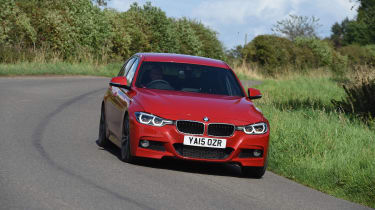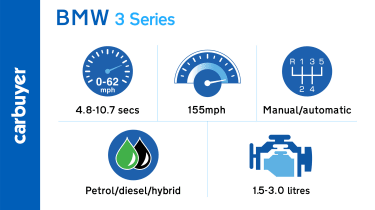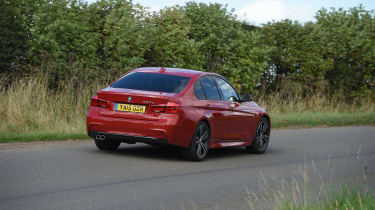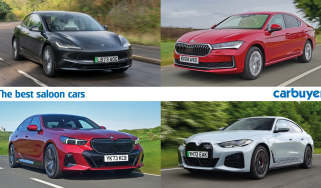BMW 3 Series saloon (2011-2018) - Engines, drive & performance
All BMW 3 Series models are fun to drive, from the basic diesel to the range-topping petrol
An entertaining driving experience is at the heart of the BMW 3 Series' appeal. With good grip, firm suspension and well weighted steering, the BMW is a joy to drive on twisting back roads.
There is, however, a slight ‘dead spot’ in the steering when you’re driving at motorway speeds. That’s apparently due to feedback from US and Chinese buyers, who disliked having to make twitchy steering inputs. It works, but we don’t think it’ll suit everyone. It’s worth noting also that despite the 3 Series long being a benchmark for a great driving experience, the newer Jaguar XE and Alfa Romeo Giulia are very strong contenders in this area, too.
BMW offers adaptive dampers, which are a must for any 3 Series model, no matter how much power it has. The way the 3 Series controls its body is excellent and these dampers definitely improve the overall ride quality.
All models have a six-speed manual gearbox as standard. However, for around £1,500, you can add an excellent eight-speed automatic. If you can afford to do so, we'd recommend it, as not only does it deliver silky-smooth shifts, in most cases it's also more efficient than the manual. This gearbox has a Sport+ transmission mode, but the gearchanges can feel a little sharp and jerky when this is used.
BMW 3 Series petrol engines
Even the entry-level engines deliver keen performance, with the three-cylinder 1.5-litre BMW 318i going from 0-62mph in 8.9 seconds. This engine has to be worked harder to deliver similar performance to the entry-level diesel but it's surprisingly refined.
More reviews
Move up to the 2.0-litre BMW 320i and BMW 330i and the 3 Series starts to get significantly quicker, taking from 7.2 and 5.9 seconds respectively to do 0-62mph. If you spend a lot of time around town or popping to the shops, one of the less powerful petrols should suit you fine.
Excluding the very expensive BMW M3 high-performance saloon, the fastest standard BMW 3 Series is the BMW 340i, which will go from 0-62mph in just 5.5 seconds – almost as quick as the entry-level Porsche 718 Cayman. With the optional adaptive M Sport suspension (around £500), the Comfort mode is perfect for UK roads but all the other settings feel too firm. This makes it unfortunate that BMW won't let you mix and match the settings - if you want the most aggressive throttle and steering response, you also have to the firmest suspension setting.
The 340i is certainly fast and remains quiet at cruising pace, but the engine lacks a little character and it's hard to justify the extra money you'll pay to buy and run the car compared to the 330d. As indulgent as it may sound, if you’re in the market for a fast, petrol-powered 3 Series, the M3 saloon is a better option if you can afford it.
Diesel engines
Don't discount the diesels; they're very nearly as fast as the petrols. For instance, the BMW 320d actually has 6bhp more than the 320i petrol and accelerates from 0-62mph in around 7.5 seconds. For most buyers (especially high-mileage motorway drivers) this fast and frugal model is the pick of the range. It's a little noisy in stop-start traffic, but becomes smooth and responsive once you're on the move and feels even quicker in the real world than the petrol 320i. It’s definitely our top choice.
Whatever engine you pick, you'll get the same entertaining and engaging driving experience. In many respects, the standard four-cylinder diesels serve up more fun, thanks to their softer suspension and more natural steering feel. Sport models and above get Performance Drive Control, which allows you to alter the steering weight and accelerator response at the touch of a button. Some enthusiasts will be disappointed to learn the steering is these days slightly less direct than you’d expect from a 3 Series, in order to make the car less 'twitchy' while cruising on the motorway.
M Sport models have stiffer suspension, which results in a firmer ride, although if you value comfort over handling, it's possible replace this with the standard springs and dampers at no extra cost. You can also add the optional adaptive dampers, which stiffen the suspension for enthusiastic driving and soften it when you want to relax. They’re a very useful option no matter what version of the 3 Series you choose.
The really good news is that the 3 Series' sporty driving experience doesn't come at the expense of refinement. The four-cylinder diesels rattle a little at a standstill, but get smoother at speed, while wind and road noise are well suppressed. And, apart from the M Sport models with their firmer suspension, the BMW 3 Series irons out potholes effectively, offering a comfortable experience for both driver and passengers.
Hybrid engine
The 330e PHEV (plug-in hybrid electric vehicle) is powered by a turbocharged 2.0-litre petrol engine and an electric motor, producing 249bhp between them. It's good for a 0-62mph time of 6.1 seconds and a top speed of 140mph, while the 25-mile all-electric range can be saved for when you want to use it. The 330e is incredibly quiet in full battery mode, and BMW has done a great job of keeping engine and road noise to a minimum at higher speeds. It feels a little heavier going around corners but it's not too noticeable, plus this version is very quick.
















